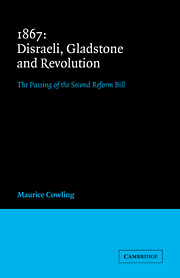Book contents
- Frontmatter
- Contents
- Preface
- Dedication
- Introduction
- I Prelude
- II Preliminary: The uprooting of the Whigs
- III The cornering of the Conservative party
- IV The reassertion of Conservative policy
- V The destruction of Liberal unity
- VI The victory of Disraeli
- VII The public agitation
- VIII The acceptance of Hodgkinson's amendment
- IX Conclusion: Palmerston's mantle
- Epilogue: The limitations of historical knowledge
- Appendixes
- Bibliography
- Notes
- Index
VI - The victory of Disraeli
Published online by Cambridge University Press: 18 December 2009
- Frontmatter
- Contents
- Preface
- Dedication
- Introduction
- I Prelude
- II Preliminary: The uprooting of the Whigs
- III The cornering of the Conservative party
- IV The reassertion of Conservative policy
- V The destruction of Liberal unity
- VI The victory of Disraeli
- VII The public agitation
- VIII The acceptance of Hodgkinson's amendment
- IX Conclusion: Palmerston's mantle
- Epilogue: The limitations of historical knowledge
- Appendixes
- Bibliography
- Notes
- Index
Summary
‘D'Israeli…is the government.’
Knatchbull-Hugessen: Diary, May 29 1867The dissension in the Liberal party, culminating in the Tea-Room revolt and withdrawal of Coleridge's Instruction, had three consequences. It destroyed any chance there might have been of a large Conservative Cave. It established the government's bill as a going concern. It persuaded Gladstone that he must make a stand if he was to create the Liberal party in his own image. Though there was little chance at any time of a large Conservative vote for Gladstone on April 12, the Tea-Room revolt put it out of the question. At a moment at which the Liberal party was afraid to follow Gladstone in adopting any part of the Conservative party's restrictive role, it was unthinkable that he should attract a restrictive following elsewhere. There was no guarantee that a Gladstone government, if that followed a successful vote, would be more successful than Derby's. There was no guarantee that Gladstone would be able, if he wanted, to call a halt to progress. Although Gladstone had been ‘all that is frank and straightforward, as well as kind’, even so certain an enemy of the government's bill as Sir William Heathcote, who voted with Gladstone on April 12, found it ‘alarming’ to be involved in ‘joint action with a party which neither knows its own mind nor its obligation to its leader for twenty-four hours’. In drafting Coleridge's Instruction before the Tea-Room meeting took place, Heathcote and Cranborne had tried to stop Gladstone committing himself to a specific franchise level, because the £5 level he would want to mention would be too low for the sort of Conservative they hoped would support them.
- Type
- Chapter
- Information
- 1867 Disraeli, Gladstone and RevolutionThe Passing of the Second Reform Bill, pp. 217 - 241Publisher: Cambridge University PressPrint publication year: 1967

